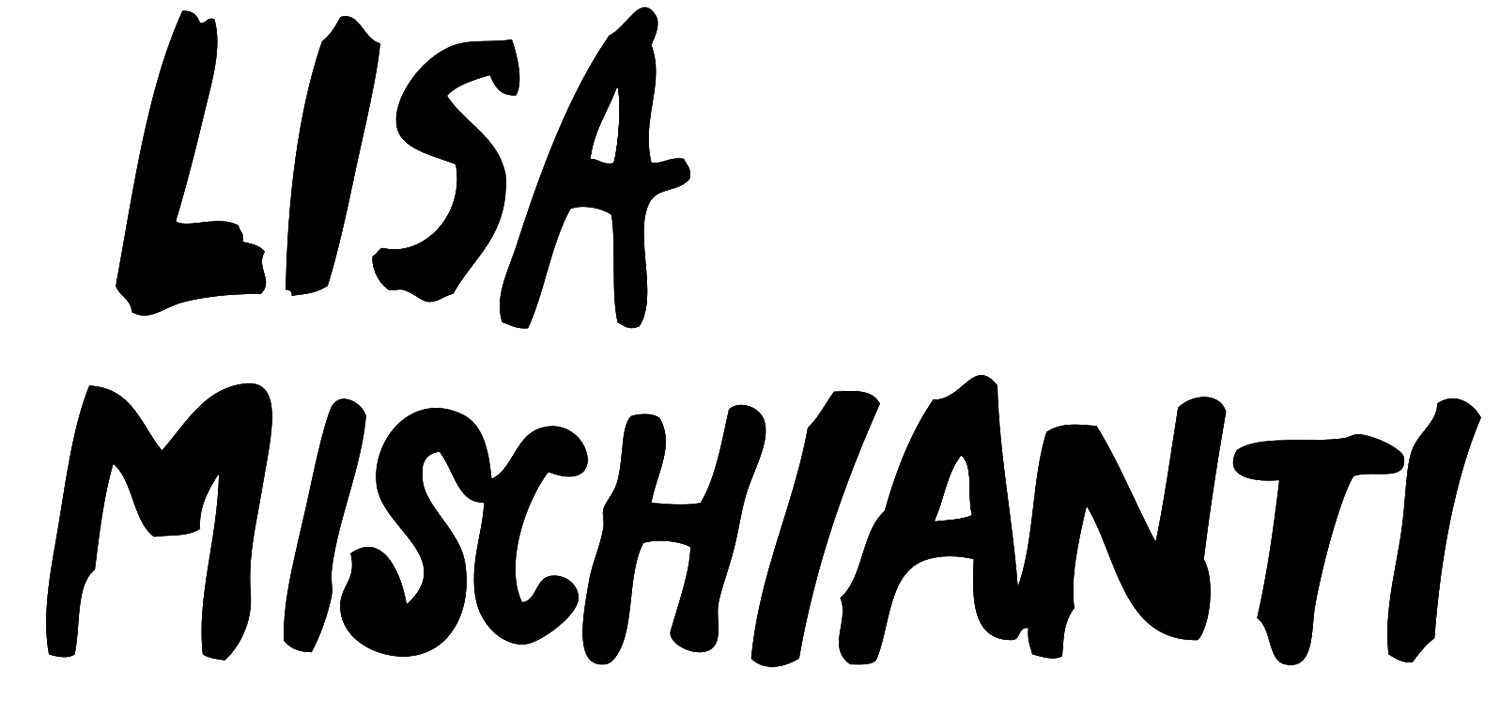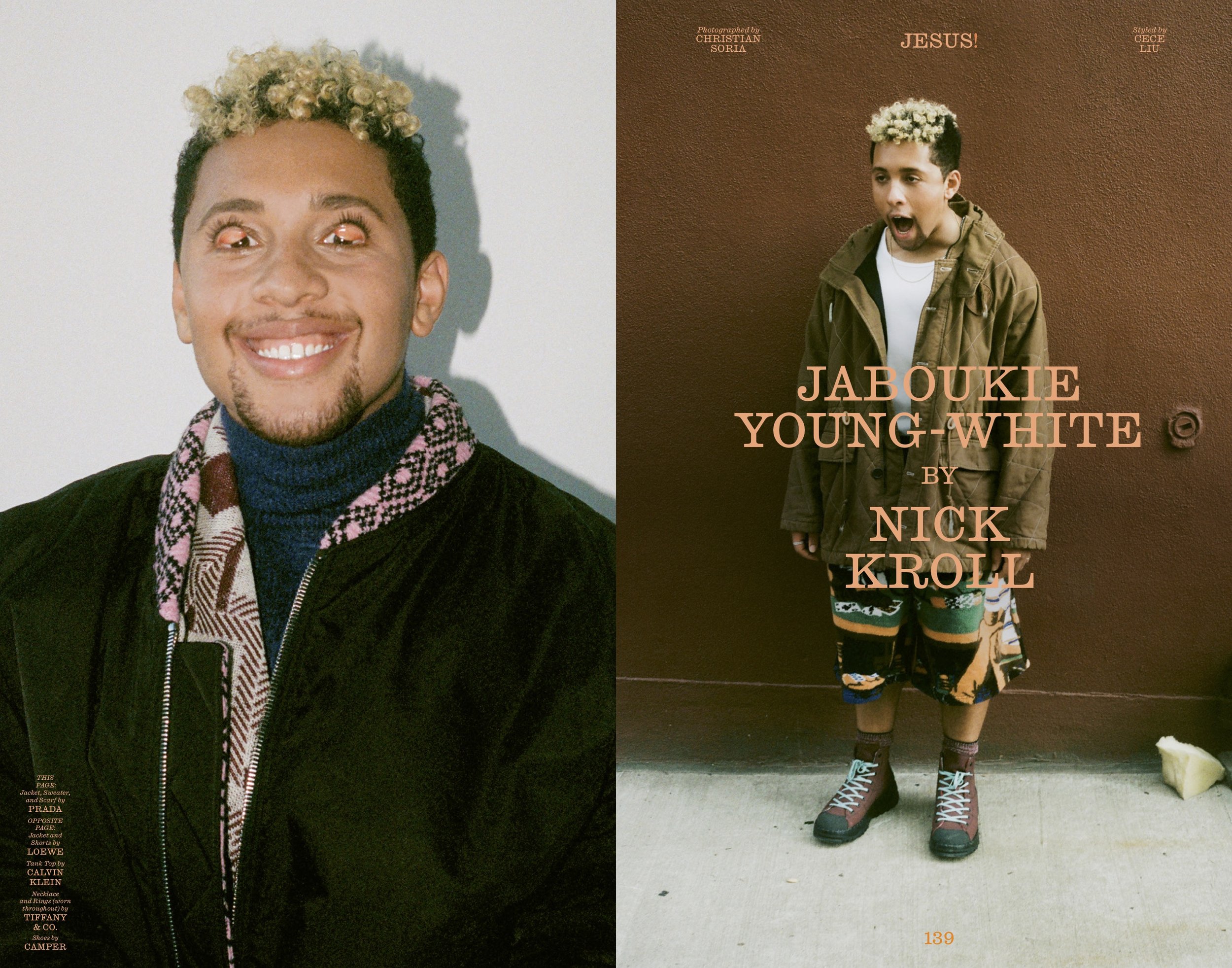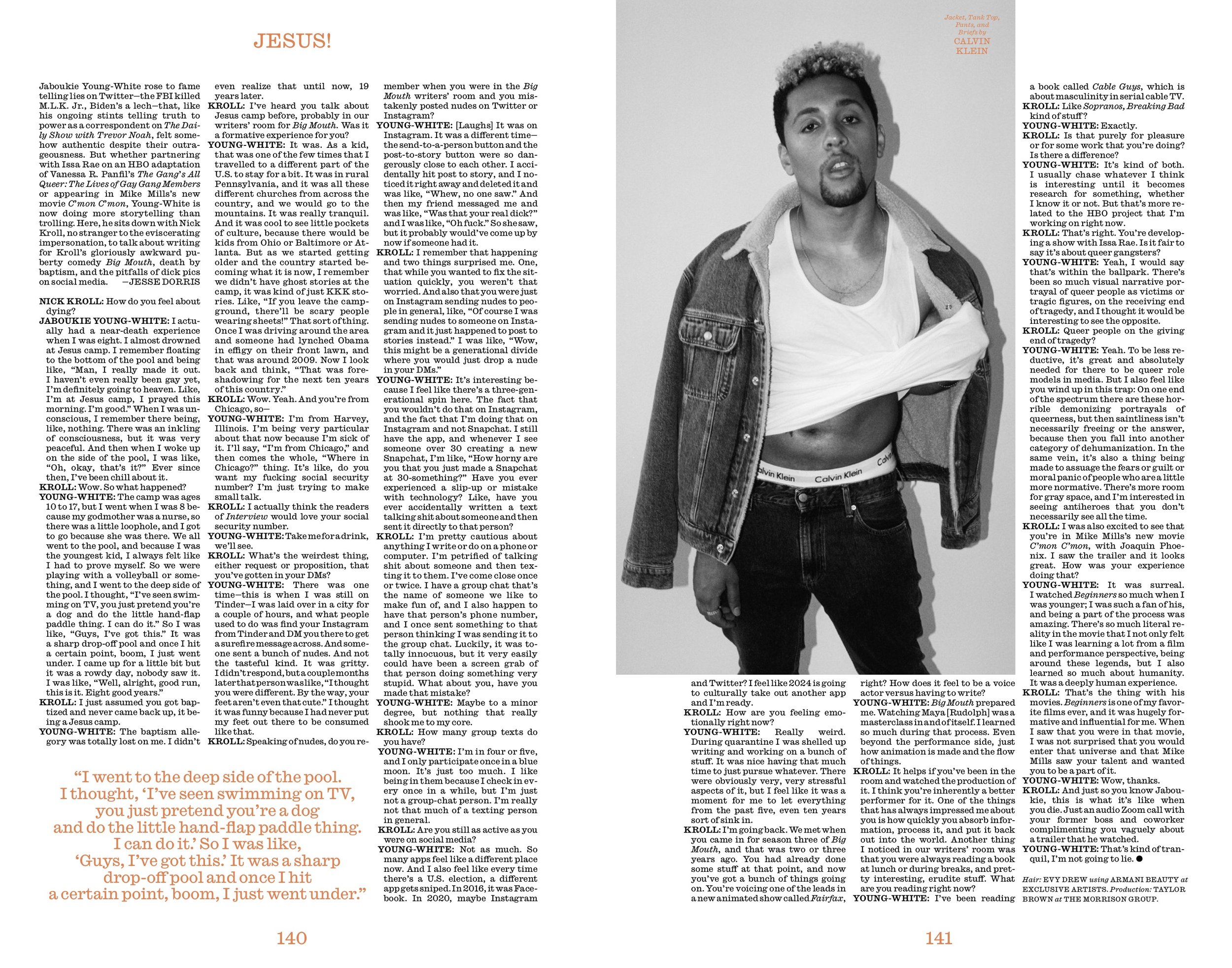JABOUKIE YOUNG-WHITE X NICK KROLL
Jaboukie Young-White rose to fame telling lies on Twitter—the FBI killed M.L.K. Jr., Biden’s a lech—that, like his ongoing stints telling truth to power as a correspondent on The Daily Show with Trevor Noah, felt somehow authentic despite their outrageousness. But whether partnering with Issa Rae on an HBO adaptation of Vanessa R. Panfil’s The Gang’s All Queer: The Lives of Gay Gang Members or appearing in Mike Mills’s new movie C’mon C’mon, Young-White is now doing more storytelling than trolling. Here, he sits down with Nick Kroll, no stranger to the eviscerating impersonation, to talk about writing for Kroll’s gloriously awkward puberty comedy Big Mouth, death by baptism, and the pitfalls of dick pics on social media. JESSE DORRIS
NICK KROLL: How do you feel about dying?
JABOUKIE YOUNG-WHITE: I actually had a near-death experience when I was eight. I almost drowned at Jesus camp. I remember floating to the bottom of the pool and being like, “Man, I really made it out. I haven’t even really been gay yet, I’m definitely going to heaven. Like, I’m at Jesus camp, I prayed this morning. I’m good.” When I was unconscious, I remember there being, like, nothing. There was an inkling of consciousness, but it was very peaceful. And then when I woke up on the side of the pool, I was like, “Oh, okay, that’s it?” Ever since then, I’ve been chill about it.
KROLL: Wow. So what happened?
YOUNG-WHITE: The camp was ages 10 to 17, but I went when I was 8 because my godmother was a nurse, so there was a little loophole, and I got to go because she was there. We all went to the pool, and because I was the youngest kid, I always felt like I had to prove myself. So we were playing with a volleyball or something, and I went to the deep side of the pool. I thought, “I’ve seen swimming on TV, you just pretend you’re a dog and do the little hand-flap paddle thing. I can do it.” So I was like, “Guys, I’ve got this.” It was a sharp drop-off pool and once I hit a certain point, boom, I just went under. I came up for a little bit but it was a rowdy day, nobody saw it. I was like, “Well, alright, good run, this is it. Eight good years.”
KROLL: I just assumed you got baptized and never came back up, it being a Jesus camp.
YOUNG-WHITE: The baptism allegory was totally lost on me. I didn’t even realize that until now, 19 years later.
KROLL: I’ve heard you talk about Jesus camp before, probably in our writers’ room for Big Mouth. Was it a formative experience for you?
YOUNG-WHITE: It was. As a kid, that was one of the few times that I traveled to a different part of the U.S. to stay for a bit. It was in rural Pennsylvania, and it was all these different churches from across the country, and we would go to the mountains. It was really tranquil. And it was cool to see little pockets of culture, because there would be kids from Ohio or Baltimore or Atlanta. But as we started getting older and the country started becoming what it is now, I remember we didn’t have ghost stories at the camp, it was kind of just KKK stories. Like, “If you leave the campground, there’ll be scary people wearing sheets!” That sort of thing. Once I was driving around the area and someone had lynched Obama in effigy on their front lawn, and that was around 2009. Now I look back and think, “That was foreshadowing for the next ten years of this country.”
KROLL: Wow. Yeah. And you’re from Chicago, so—
YOUNG-WHITE: I’m from Harvey, Illinois. I’m being very particular about that now because I’m sick of it. I’ll say, “I’m from Chicago,” and then comes the whole, “Where in Chicago?” thing. It’s like, do you want my fucking social security number? I’m just trying to make small talk.
KROLL: I actually think the readers of Interview would love your social security number.
YOUNG-WHITE: Take me for a drink, we’ll see.
KROLL: What’s the weirdest thing, either request or proposition, that you’ve gotten in your DMs?
YOUNG-WHITE: There was one time—this is when I was still on Tinder—I was laid over in a city for a couple of hours, and what people used to do was find your Instagram from Tinder and DM you there to get a surefire message across. And someone sent a bunch of nudes. And not the tasteful kind. It was gritty. I didn’t respond, but a couple months later that person was like, “I thought you were different. By the way, your feet aren’t even that cute.” I thought it was funny because I had never put my feet out there to be consumed like that.
KROLL: Speaking of nudes, do you remember when you were in the Big Mouth writers’ room and you mistakenly posted nudes on Twitter or Instagram?
YOUNG-WHITE: [Laughs] It was on Instagram. It was a different time—the send-to-a-person button and the post-to-story button were so dangerously close to each other. I accidentally hit post to story, and I noticed it right away and deleted it and was like, “Whew, no one saw.” And then my friend messaged me and was like, “Was that your real dick?” and I was like, “Oh fuck.” So she saw, but it probably would’ve come up by now if someone had it.
KROLL: I remember that happening and two things surprised me. One, that while you wanted to fix the situation quickly, you weren’t that worried. And also that you were just on Instagram sending nudes to people in general, like, “Of course I was sending nudes to someone on Instagram and it just happened to post to stories instead.” I was like, “Wow, this might be a generational divide where you would just drop a nude in your DMs.”
YOUNG-WHITE: It’s interesting because I feel like there’s a three-generational spin here. The fact that you wouldn’t do that on Instagram, and the fact that I’m doing that on Instagram and not Snapchat. I still have the app, and whenever I see someone over 30 creating a new Snapchat, I’m like, “How horny are you that you just made a Snapchat at 30-something?” Have you ever experienced a slip-up or mistake with technology? Like, have you ever accidentally written a text talking shit about someone and then sent it directly to that person?
KROLL: I’m pretty cautious about anything I write or do on a phone or computer. I’m petrified of talking shit about someone and then texting it to them. I’ve come close once or twice. I have a group chat that’s the name of someone we like to make fun of, and I also happen to have that person’s phone number, and I once sent something to that person thinking I was sending it to the group chat. Luckily, it was totally innocuous, but it very easily could have been a screen grab of that person doing something very stupid. What about you, have you made that mistake?
YOUNG-WHITE: Maybe to a minor degree, but nothing that really shook me to my core.
KROLL: How many group texts do you have?
YOUNG-WHITE: I’m in four or five, and I only participate once in a blue moon. It’s just too much. I like being in them because I check in every once in a while, but I’m just not a group-chat person. I’m really not that much of a texting person in general.
KROLL: Are you still as active as you were on social media?
YOUNG-WHITE: Not as much. So many apps feel like a different place now. And I also feel like every time there’s a U.S. election, a different app gets sniped. In 2016, it was Facebook. In 2020, maybe Instagram and Twitter? I feel like 2024 is going to culturally take out another app and I’m ready.
KROLL: How are you feeling emotionally right now?
YOUNG-WHITE: Really weird. During quarantine I was shelled up writing and working on a bunch of stuff. It was nice having that much time to just pursue whatever. There were obviously very, very stressful aspects of it, but I feel like it was a moment for me to let everything from the past five, even ten years sort of sink in.
KROLL: I’m going back. We met when you came in for season three of Big Mouth, and that was two or three years ago. You had already done some stuff at that point, and now you’ve got a bunch of things going on. You’re voicing one of the leads in a new animated show called Fairfax, right? How does it feel to be a voice actor versus having to write?
YOUNG-WHITE: Big Mouth prepared me. Watching Maya [Rudolph] was a masterclass in and of itself. I learned so much during that process. Even beyond the performance side, just how animation is made and the flow of things.
KROLL: It helps if you’ve been in the room and watched the production of it. I think you’re inherently a better performer for it. One of the things that has always impressed me about you is how quickly you absorb information, process it, and put it back out into the world. Another thing I noticed in our writers’ room was that you were always reading a book at lunch or during breaks, and pretty interesting, erudite stuff. What are you reading right now?
YOUNG-WHITE: I’ve been reading a book called Cable Guys, which is about masculinity in serial cable TV.
KROLL: Like Sopranos, Breaking Bad kind of stuff?
YOUNG-WHITE: Exactly.
KROLL: Is that purely for pleasure or for some work that you’re doing? Is there a difference?
YOUNG-WHITE: It’s kind of both. I usually chase whatever I think is interesting until it becomes research for something, whether I know it or not. But that’s more related to the HBO project that I’m working on right now.
KROLL: That’s right. You’re developing a show with Issa Rae. Is it fair to say it’s about queer gangsters?
YOUNG-WHITE: Yeah, I would say that’s within the ballpark. There’s been so much visual narrative portrayal of queer people as victims or tragic figures, on the receiving end of tragedy, and I thought it would be interesting to see the opposite.
KROLL: Queer people on the giving end of tragedy?
YOUNG-WHITE: Yeah. To be less reductive, it’s great and absolutely needed for there to be queer role models in media. But I also feel like you wind up in this trap: On one end of the spectrum there are these horrible demonizing portrayals of queerness, but then saintliness isn’t necessarily freeing or the answer, because then you fall into another category of dehumanization. In the same vein, it’s also a thing being made to assuage the fears or guilt or moral panic of people who are a little more normative. There’s more room for gray space, and I’m interested in seeing antiheroes that you don’t necessarily see all the time.
KROLL: I was also excited to see that you’re in Mike Mills’s new movie C’mon C’mon, with Joaquin Phoenix. I saw the trailer and it looks great. How was your experience doing that?
YOUNG-WHITE: It was surreal. I watched Beginners so much when I was younger; I was such a fan of his, and being a part of the process was amazing. There’s so much literal reality in the movie that I not only felt like I was learning a lot from a film and performance perspective, being around these legends, but I also learned so much about humanity. It was a deeply human experience.
KROLL: That’s the thing with his movies. Beginners is one of my favorite films ever, and it was hugely formative and influential for me. When I saw that you were in that movie, I was not surprised that you would enter that universe and that Mike Mills saw your talent and wanted you to be a part of it.
YOUNG-WHITE: Wow, thanks.
KROLL: And just so you know Jaboukie, this is what it’s like when you die. Just an audio Zoom call with your former boss and coworker complimenting you vaguely about a trailer that he watched.
YOUNG-WHITE: That’s kind of tranquil, I’m not going to lie.



